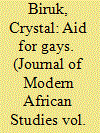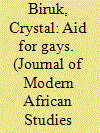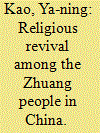| Srl | Item |
| 1 |
ID:
133617


|
|
|
|
|
| Publication |
2014.
|
| Summary/Abstract |
In recent years, 'African homophobia' has become a spectacle on the global stage, making Africa into a pre-modern site of anti-gay sentiment in need of Western intervention. This article suggests that 'homophobia' in post-2009 Malawi is an idiom through which multiple actors negotiate anxieties around governance and moral and economic dependency. I illustrate the material conditions that brought about social imaginaries of inclusion and exclusion - partially expressed through homophobic discourse - in Malawi. The article analyses the cascade of events that led to a moment of political and economic crisis in mid-2011, with special focus on how a 2009 sodomy case made homophobia available as a new genre of social commentary. Employing discourse analysis of newspaper articles, political speeches, the proceedings of a sodomy case, and discussions about men who have sex with men (MSM) as an HIV risk group, I show how African homophobia takes form via interested deployments of 'cultural' rhetoric toward competing ends. This article lends a comparative case study to a growing literature on the political and social functions of homophobia in sub-Saharan Africa.
|
|
|
|
|
|
|
|
|
|
|
|
|
|
|
|
| 2 |
ID:
133618


|
|
|
|
|
| Publication |
2014.
|
| Summary/Abstract |
In recent years, 'African homophobia' has become a spectacle on the global stage, making Africa into a pre-modern site of anti-gay sentiment in need of Western intervention. This article suggests that 'homophobia' in post-2009 Malawi is an idiom through which multiple actors negotiate anxieties around governance and moral and economic dependency. I illustrate the material conditions that brought about social imaginaries of inclusion and exclusion - partially expressed through homophobic discourse - in Malawi. The article analyses the cascade of events that led to a moment of political and economic crisis in mid-2011, with special focus on how a 2009 sodomy case made homophobia available as a new genre of social commentary. Employing discourse analysis of newspaper articles, political speeches, the proceedings of a sodomy case, and discussions about men who have sex with men (MSM) as an HIV risk group, I show how African homophobia takes form via interested deployments of 'cultural' rhetoric toward competing ends. This article lends a comparative case study to a growing literature on the political and social functions of homophobia in sub-Saharan Africa.
|
|
|
|
|
|
|
|
|
|
|
|
|
|
|
|
| 3 |
ID:
132733


|
|
|
|
|
| Publication |
2014.
|
| Summary/Abstract |
This paper examines two cases of Zhuang religious revival involving multiple actors. It shows how consideration of "superstition" (??, mixin) places some religious practice outside the institutional framework when discussing the modern concept of religion in China. In this paper, I particularly focus on two main dimensions of religious revival among the Zhuang people. The first is a grassroots dimension that involves the revival of a so-called "superstitious" cult in which Zhuang people along the Sino-Vietnamese border carry out shamanic rituals to make offerings to a powerful chief-turned-deity, Nong Zhigao, and his wife. The second dimension is a top-down dynamic and involves a series of projects conducted by Zhuang officials, scholars and business persons, which aim to standardize a Zhuang religion, known as Mo religion. These two cases of religious revival demonstrate the varied strategies utilized by different actors in response to government policies regarding religion in China.
|
|
|
|
|
|
|
|
|
|
|
|
|
|
|
|